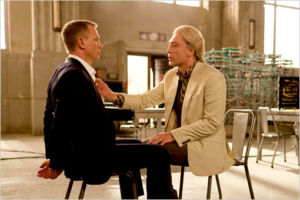A Freudian Bond movie. Really.
 I need a martini. And a cigarette.
I need a martini. And a cigarette.
In 2006, Casino Royale saved the James Bond franchise, ending the redundant self-parody that had characterized the movies since Moonraker in early 1979. Two things happened. Following the amazing success of the grimy, naturalistic, and nearly effects-less Bourne Identity, director Martin Campbell made Casino Royale as gritty and physically possible as the previous film, Die Another Day, was plastic and absurd. But probably more important, Daniel Craig was cast as Bond.
While Pierce Brosnan was basically a younger version of the dapper, wry Roger Moore, Daniel Craig’s Bond is more like Sean Connery’s: unconventionally handsome, dangerously sexy and dangerously violent.
It may be sacrilegious to say so, but I think Craig is even better than Connery. He’s more expressive, his face both more elastic and more subtle. The darkness that must push, prod and pain Bond seems to sweat out of Craig’s skin. I never saw that in any other Bond, and they were all playing professional killers as well.
This darkness has been central to the plots of Casino Royale, its follow-upQuantum of Solace, and especially the latest, Skyfall. The first two focused on Bond falling in love and having that love die in his arms and then taking revenge.
In Skyfall, the revenge is not Bond’s, but rather it belongs to Silva (Javier Bardem), an insane and insanely bitter former MI6 agent out to destroy M (Judi Dench) by exposing the identities of all of her undercover agents and then, for the cake’s icing, killing her during a hearing of Parliament.
In fighting Silva and protecting M, Bond’s darkness becomes Freudian. Not only do we see his insane risk-taking and his pathological death drive, but we also gain insight into Bond’s childhood and an explanation for his dogged support and attachment for M.
This is not to say that Skyfall is all about Bond brooding, but it is at times as bleak as it is thrilling and entertaining. The thrills come in the form of the kind of muscular, rollicking action that is expected from all Bond movies. There are chase scenes, fist fights, several big explosions, a couple of extremely beautiful women, and about 45 minutes too much film.
This episode’s director, Sam Mendes, is best known for making American Beautyand other high-brow dramas, and he transitions to action-adventure relatively well. The action is all believable, if not exceptional. (He’s no Paul Greengrass or Christopher Nolan, but who is?)
Mendes excels at the dramatic and comic, and with Craig, Dench and Bardem, he gets to have a great deal of fun. Or rather, they do. Craig’s Bond is a bitter, scarred jerk, and his scenes with Dench are taut and edgy.
It helps that the movie is as much about M as it is Bond, and in fleshing out her character, she is given more depth, rage, pathos and snark than ever before.
But it is Bardem who absconds with every one of his scenes – and elaborately so, as if he’s pulling a heist. With dyed blond hair, his trademark Spanish accent, a sadism that is more than a little sexual, and with evil utterances as witty as a smarter Dr. Evil, Silva is the best bond villain since Gert Fröbe’s Auric Goldfinger.
Silva’s obvious homosexuality allows his first scene with a bound and trapped Bond to be both hysterically funny and delightfully creepy. I wish that the first gay character in a James Bond movie wasn’t a sociopath with an oedipal conflict – there’s Freud again – but if it has to be, I’m happy it’s someone as delicious as Silva.
Skyfall
Directed by Sam Mendes
Written by Neil Purvis, Robert Wade and John Logan
Starring Daniel Craig, Judi Dench and Javier Bardem
Rated PG-13
Opens Nov. 9
At your local multiplex